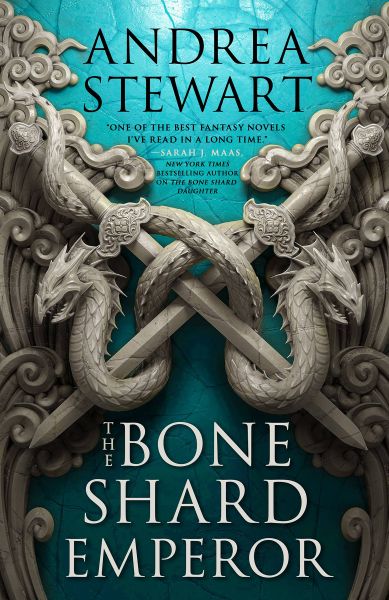For Whom These Vile Shackles
The Bone Shard Emperor (The Drowning Empire, volume 2)
By Andrea Stewart

4 Oct, 2021
0 comments
The Bone Shard Emperor is the second volume in Andrea Stewart’s The Drowning Empire series.
Lin Sukai outmaneuvered her abusive father, killed him, and took his place as emperor. Eschewing the old man’s dubious methods, she is determined to be a just, kind ruler rather than rule as did her father. The Empire’s problems are solved!
Or are they?
High on Lin’s list of concerns: she is not a human, as such. She is made of the same material as humans, and she was made in the form of a human, but she is an artificial being. Entities like her are generally seen as living devices rather than people. Concealing her nature is key to maintaining power; no governor will follow the orders of an adding machine. Not even a living one.
Lin has to deal with ambitious, potentially rebellious governors. She also has to deal with revolutionaries. The Shardless Few are determined to replace good old reliable brutal autocracy with some sort of “responsible government.” How this will work in practice is a bit unclear, the Empire having no experience with democracy. Step one is, however, clear: deposing Lin.
At least Lin can depend on her Captain of the Imperial Guard, Jovis, to protect her from unruly subordinates and would-be republicans. Or at least she could, were it not that Jovis has ties to the Shardless Few. It’s not at all clear to which set of loyalties he is more faithful. He’s wavering.
Lin’s creator (her father) was a control freak who would never have relinquished power had he a choice in the matter. Accordingly, he was not the sort of person to leave briefing notes for his successor.
One important matter: learning the nature of the Empire’s once vanquished foes, the Alanga. Alanga seem to be reappearing. Learning about the Alanga may be of great personal concern to both Lin and Jovis (Captain of the Guard), as it is possible that they are actually Alanga.
Another important matter: a rival claimant to the throne. Nisong claims to be Lin’s older half-sister and thus the rightful heir. The old emperor had stuffed her into an oubliette. She has escaped and is busy assembling an army of constructs. (Oppose her, she’ll kill you and animate your body as another warrior in the force. Something like the soldiers in Leckie’s Justice series.)
Lin’s army is far smaller than Nisong’s. Defeat appears inevitable.
~oOo~
The Empire has a weirdly simple structure, requiring a lot more hands-on work from Lin than I’d expect from an empire with a bunch of satrapies. (Such empires have often let the satraps do much of the governing, as long as the satraps remitted a chunk of the taxes they collected and refrained from challenging the shah’s control of the army and the state religion.) It’s unfortunate, then, that Lin’s father seems to have been a glorious example of failure modes for highly centralized autocratic states. In particular, his love of secrecy has meant that the new ruler is facing several crises of unknown origin and nature.
I was intrigued by the rudimentary attempt at democracy described in the book. I was confirmed in my cynicism re idealism in the powerful when Lin and at least one other aristocrat agree that the system must change … as long as they keep their personal power. In Lin’s case this is understandable — her goals were survival, getting rid of dad, and putting an end to her father’s abuses — but the other character has pretensions of being a revolutionary without being quite being able to imagine a regime ruled by consensus rather than autocratic decree. Ah, well. Baby steps!
The novel regularly jumps from one viewpoint character to another viewpoint character. Each gets a short chapter before the narrative moves on. This has the advantage that one does not have time to get bored with any given storyline. Unfortunately, while the characters are distinct, their voices are hard to tell apart. This can make for a confusing read.
Nevertheless, epics in which at least some of the cast are striving towards a more democratic state are rare. I will pursue this to see if our heroes are successful, or if this is more akin to the Bucolic War, Stellinga Uprising, Rebellion of Ch’iu Fu, Rebellion of Wang Xianzhi, Rebellion of Huang Chao, Basil the Copper Hand Rebellions, Da Shu rebellion in Sichuan, Peasant revolt in Flanders, St. George’s Night Uprising, Jacquerie, Peasants’ Revolt in England, Transylvanian peasant revolt, Hallvard Graatops Revolt,to name only a few uprising that did not end well for the upstarts.
The Bone Shard Emperor is available here (Amazon US), here (Amazon Canada), here (Amazon UK), here (Barnes & Noble), here (Book Depository), and here (Chapters-Indigo).
